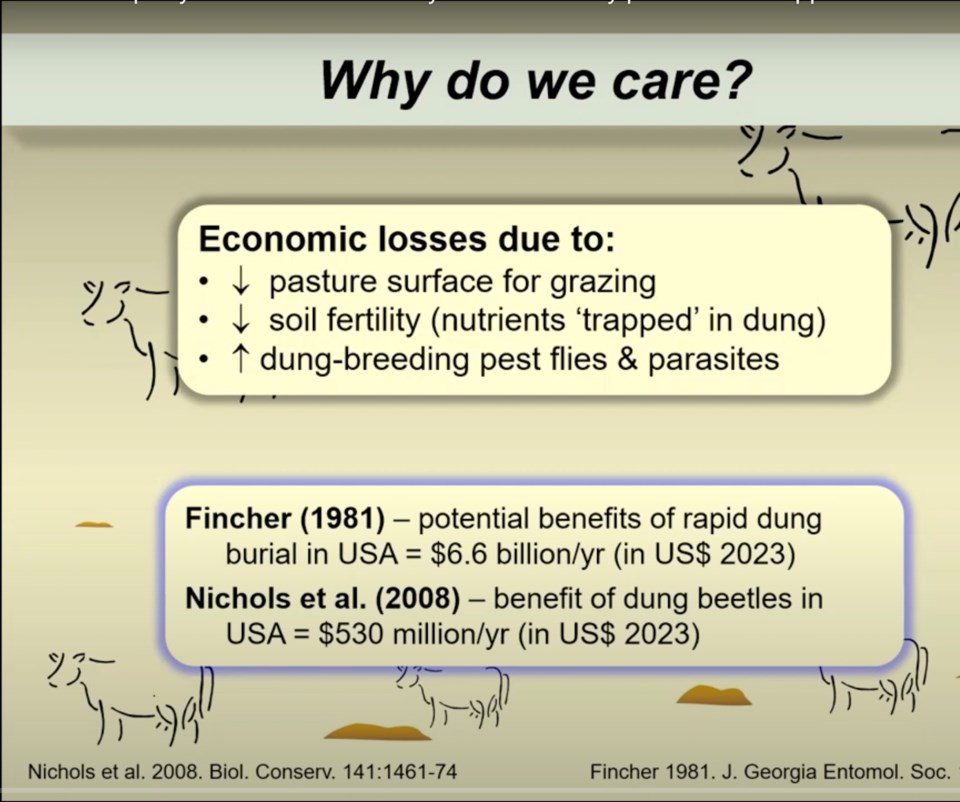ATHABASCA – For most people, the only time cow dung, or a derivative term thereof, comes into conversation is when they’re hearing a tall tale.
For Dr. Kevin Floate, it happens everyday in the office.
Dr. Floate was the latest guest lecturer for Athabasca University’s Science Outreach program, appearing for just under an hour-and-a-half March 28 to talk about his one of his areas of expertise, the lasting impacts of chemical residues in livestock dung.
If your first response is “Why should I care?” Floate has some numbers for you. He cited two different studies that looked at the economic loss that cattle dung has on pastures: the first, Fincher (1981), estimated that if we could magically wave a wand and remove cattle dung as it was deposited, it would be worth roughly $6.6 billion USD, adjusted for inflation, although Floate did refer to these as “back-of-the-napkin calculations” that seemed to be rather high.
While Floate is skeptical of the first number, the second study he pulled from estimated that dung beetles are worth $530 million USD a year, which seems on par with his own estimations.
Dung Beetles, and other related insects, play an important role in modern agriculture as they decompose cow patties, and help pastures in post-grazing recovery. Cows won’t graze on grass that either has a patty on or near it as according to Floate, it creates an unpleasant taste for them.
If the patties don’t get broken down, the nutrients within get "trapped" and they become a breeding ground for dung-breeding pest flies and parasites that have an adverse effect on livestock.
In a typical, non-human influenced ecosystem, there wouldn’t be anything from preventing these insects from doing their jobs, Floate said. However, once you add the human influence, specifically the treatment of herds with parasiticides (medications that help prevent parasite infestations), there can be some adverse effects on the populations of these beneficial critters.
Part of the issue for Floate and his co-workers is quantifying the impacts that these residues have is that there are a multitude of different dung beetles, and properly controlling is remarkably difficult.
Floate highlighted some of the other factors that could be impacting their numbers: temperature, humidity, precipitation, age, vertebrate activity, the time of year, and the location in the pasture, just to name a few. As such, concrete conclusions can be hard to pull.
“I can tell you with confidence that residues can affect attraction to dung by insects, but I can’t tell you if you’re going to get more or less insects, and I can’t tell you if a beetle that was repelled this year will be repelled again next year,” said Floate, referencing a study from 1998.
Other critters
Floate also talked about a miniature ecosystem that he refers to as “the cow dung community.” Unlike the studies that only looked at beetles, Floate has found that common medications can have a “sub-lethal” effect on these critters, since a disruption to a dung-feeding fly population would also eliminate a food source for a parasitoid wasp, or a predatory beetle.
LongRange, which is a newer medication, is administered at the start of the grazing season, and is then active for up to 150 days. Using data from two studies, he said he was able to conclusively demonstrate the negative effects the medication had on various species of flies, and the wasps that prey on them.
“If I’m a rancher and I put my cows on a pasture May 1 and I treat them with LongRange, for that entire grazing season, the fresh dung that they deposit will contain residues at high enough levels to completely suppress development of at least a few insect species,” said Floate, who noted that this was consistent across the years.



